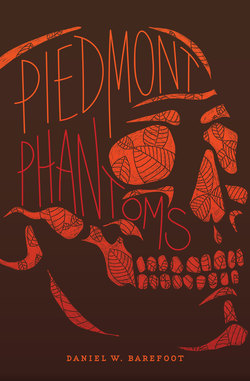Читать книгу Piedmont Phantoms - Daniel W. Barefoot - Страница 17
На сайте Литреса книга снята с продажи.
ОглавлениеCUMBERLAND COUNTY
“Free! oh, Free!”
We do not easily suspect evil of those whom we love most.
Peter Abelard
Fayetteville, one of the oldest and most historic cities in North Carolina, owed much of its early prominence to the mighty Cape Fear River, which courses through its corporate limits. Chartered in 1762, the city is located at the head of navigation on the river. In the nineteenth century, passenger steamboats connected Fayetteville with Wilmington and other ports and towns downriver.
The ghost of a pretty young woman who lived in Fayetteville in 1858 during the days of river travel is said to continue to walk the banks of the Cape Fear. Her name was Louisa, and she resided on the small farm of the uncle who reared her from childhood. Alas, Louisa’s family was quite poor. Her uncle eked out a meager existence by growing sugarcane on the dark, fertile bottom land along the river.
On a nearby plantation was a handsome young overseer of slaves. Freeman, as he was named, was the son of aristocratic parents with whom he had a broken relationship. Louisa and Freeman met and soon began to see each other on a regular basis. Louisa’s uncle disapproved of the courtship and warned his niece to stay away from “Free,” as she called him, because the boy was no good. Unfortunately, the admonition came too late, for Louisa was already deeply in love with him.
As twilight drew the curtain on a splendid afternoon, the two lovers decided to take a walk along the river. In the course of their romantic stroll, the sweet Louisa informed Free that she was with child. She insisted that they make immediate plans for a wedding in order to avoid public disgrace. Free was shocked at the news but was willing to marry her.
But fate cruelly intervened the next morning. Free’s father called on him at the plantation where the young man worked. The forgiving patriarch invited his prodigal son to return home to the lavish lifestyle he had enjoyed prior to their family disagreement. Elated by the sudden change in his fortune, Free planned to make the long trip home the following day. But before he departed, there was a problem he had to address.
Once again, Free and Louisa met at the river and walked the path where they had spent many an enchanted evening. Free apparently informed her of his reconciliation with his parents and his plan to return home, because the young woman was heard by a passerby to exclaim, “But you wouldn’t come back. If you refuse, I shall go to your father and tell him the truth tonight. I can’t face Uncle.”
At first light the next day, Free and his parents left Fayetteville without telling anyone their destination. When the time came for Louisa to arise, her uncle was dismayed to discover her bed empty. He went to the plantation to find Free in the vain hope that Louisa might be with him. Upon learning that Free had left for parts unknown, the worried man made a desperate but unsuccessful attempt to locate him.
Three days later, the uncle’s greatest fears were realized. Some men found Louisa’s body floating against a log in the dark waters of the Cape Fear. Her corpse was tangled in yellow jessamine and honeysuckle vines. When authorities examined the corpse, they discovered a long, dark bruise across her forehead. She had died from blunt-force trauma.
Louisa was buried in a small family cemetery near the bank of the river where she had loved to walk with her dear Free. Following her burial, her uncle initiated a relentless search for her elusive lover. He successfully located the family’s large plantation in South Carolina. According to Free’s father, the young man had gone to Texas.
Because of limited resources, the uncle was forced to return to Fayetteville. Then the War Between the States ensued, rendering a trip to Texas impossible. Once the conflict was over, Louisa’s uncle did indeed visit the Lone Star State in his quest to bring Free to justice. There, he was given the news: Free had fought gallantly and died nobly as a soldier in the army of the Confederate States of America. In Texas, he left behind a lonely widow and a tiny son.
And what of Louisa and the unborn child she carried? Not long after her death, reports began to circulate that the apparition of a pretty young woman tangled in vines could be seen along the bank of the Cape Fear. To this day, the ghost of Louisa floats about the lane where she and her beau strolled in the twilight of antebellum days. Should you walk that ancient lovers’ lane as the light of the afternoon greets the gray of the evening, do not be alarmed if you hear the heartbroken voice of a melancholy ghost cry out, “Free! Oh, Free!”
